-
What We Do
- WHERE WE WORK
-
About Us
 Welcome Message from Carol Jenkins
Welcome Message from Carol JenkinsFor more than 90 years, World Learning has equipped individuals and institutions to address the world’s most pressing problems. We believe that, working together with our partners, we can change this world for the better.
On my travels, I’ve had the opportunity to meet with many of those who have joined us in this mission. In Baghdad, we’ve trained more than 2,300 Iraqi youth who are already giving back at home. In London, our partners in the TAAP Initiative strongly believe that we are all responsible to practice inclusion. And in Vermont, our Experiment in International Living and School for International Training participants prove every day that they have the tools and the determination to change the world.
Please join us in our pursuit of a more peaceful and just world.
- Get Involved
Media Center > Story
Five Weeks in the Life of Rassu Manandhar, an Environmental Researcher and Advocate
July 18, 2019

Rassu Manandhar is on a mission to save the environment in her native Nepal.
Home to the Himalayas and a rich biodiversity, the South Asian nation is extremely vulnerable to climate change. Its air quality has been rated as the fourth-worst in the world due to vehicle emissions and waste-burning activities. “It’s growing every day,” Manandhar says. “If people’s attitudes don’t change, it doesn’t change the environment.”
For six years, this environmental advocate has been working to do just that, studying air pollution in Pokhara city and leading community campaigns to create vehicle-free zones in the capital Kathmandu. Now, as program officer at the Alternative Energy Promotion Centre, she’s focusing on climate change.
But climate change is a global problem — and its solutions are global, too.
Seeking insight into how other countries are tackling climate change, Manandhar traveled to the United States this spring as part of the Professional Fellows Program for Governance and Society. Sponsored by the U.S. Department of State, the program brings professionals to the U.S. to exchange strategies and best practices and take part in fellowships at organizations across the country. World Learning implements the South and Central Asia component of the global program, working specifically with professionals from Nepal, India, and Pakistan.
Over the course of five weeks, Manandhar met with U.S. government officials to learn about policymaking and discovered U.S. culture through new friendships. Most importantly, she gained critical insights into global climate policy while working alongside experts at the World Resources Institute (WRI), a global research organization based in Washington, DC.
Follow along with Manandhar throughout her exchange program journey.
WEEK ONE
April 30
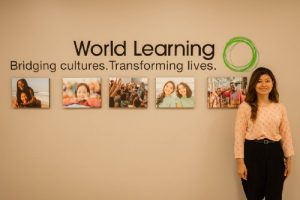
In late April, Manandhar — together with peers from Nepal, India, and Pakistan — began her program at World Learning’s headquarters in Washington, DC. During this first week, the fellows took part in workshops and briefings to learn about the U.S. legislative process and role of civil society. They also learned where they’d be placed for their three-week fellowships, many of which would be taking place in cities across the country.
Manandhar’s placement at WRI meant that she’d be staying in the nation’s capital for the duration of the program. Impressed to be working for such a renowned global research organization, Manandhar was looking forward to learning how WRI conducts research and prepares reports. She was also interested in learning more about U.S. culture, from its places, foods, and people, to its workplace environments. “The U.S. is always a good place to learn from,” she said.
May 2
After a few days of orientation, Manandhar started her fellowship at the World Resources Institute. Given her experience working on public campaigns to reduce air pollution, she was placed in the organization’s Governance Center with a cross-cutting role in air quality. Her first task? To conduct a literature review of how these campaigns are linked to global air quality policies.
WEEK TWO
May 10
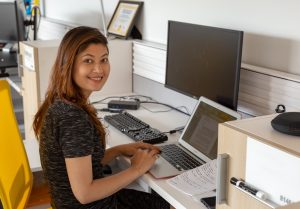
Manandhar’s first full week at WRI offered many opportunities to discover various aspects of U.S. work culture. Her fellowship happened to coincide with WRI’s biannual global meeting, which brings together staff from field offices all over the world. Manandhar was invited to attend the global meeting as well as other workshops on air pollution and climate change.
She was struck by how interactive those staff meetings could be in contrast to the lecture-style meetings that she’s more accustomed to attending. Some even included activities and games — one challenged employees to correctly sort items into compost, recycling, and trash — with prizes like water bottles. “I was very interested,” Manandhar said. “[The] activities were fun but at the same time we learned from them.”
May 11–12
Manandhar left DC to spend her first weekend in the U.S. exploring Philadelphia and New York with Rajani Tamang, another fellow from Nepal. Manandhar found the contrasts among the East Coast cities striking — from Philadelphia’s small city center to New York’s crowded megapolis.
WEEK THREE
May 16
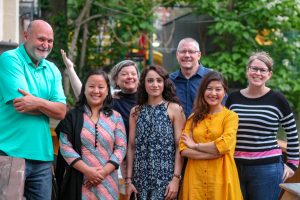
Sharing a meal is another great way to learn about a new culture. In week three, Manandhar and two other fellows (including Tamang) were invited to dinner at the home of Ron Munia, a volunteer who regularly hosts World Learning’s exchange program participants in Washington, DC.
Knowing that Munia had also invited some friends to the dinner party, Manandhar was a bit nervous. But she quickly felt at ease as the group chatted about their cultural difference and similarities over a delicious salmon dinner. “They made it very comfortable for us,” she said. “I like to meet new people and know about them. From that, we grow and we connect.”
Beyond U.S. culture, though, Manandhar was especially fascinated to learn more about Pakistani culture from her fellow program participant, Shaher Bano Abbasi, a women’s rights advocate. Manandhar says she didn’t know very much about women’s rights issues in Pakistan before the dinner party and was glad for the opportunity to learn more.
WEEK FOUR
May 22
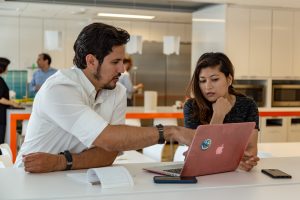
After two and a half weeks, Manandhar’s fellowship at WRI was coming to an end. She had been working diligently on her literature review with the help of her supervisor, Seth Contreras, who had offered advice on where to look for information and how to organize the report. He also offered insights from his own work at WRI. “It helped me to think how I can learn from them in implementing my campaigns and advocacy,” she said.
Manandhar also made a number of other professional connections throughout her three weeks at WRI. As a member of her Nepali organization’s core working group related to the Green Climate Fund, she was especially happy to meet a counterpart at such a renowned organized as WRI. “In Nepal, there are only a few organizations working in air pollution,” she explained. “So, if we can collaborate later and develop some projects and programs it is very important to make the connections.”
WEEK FIVE
May 29
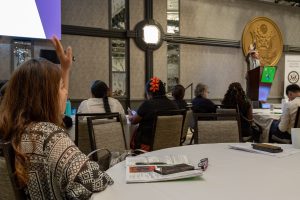
At the end of their fellowships, the rest of her South and Central Asian peers in the Professional Fellows for Governance and Society rejoined Manandhar in Washington, DC. For their final week of the program, they attended the Professional Fellows Congress, which gathers more than 200 fellows from 48 countries to develop leadership skills and build international networks.
Manandhar had an especially interesting experience in making new connections at the congress thanks to Vladimir Spencer, program manager at World Learning. He was hosting a dinner party at his house later that week and challenged the fellows to make at least one new friend at the congress who would accompany them to the party. Manandhar spent the conference chatting with fellows from all over the world and ended up befriending an environmental expert from Turkey. “That was interesting as well, to connect with people differently,” she said.
POST-EXCHANGE
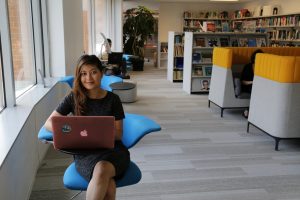
Manandhar has been quick to share what she learned in the U.S. since she returned to Nepal. As part of her project plan to educate the public on the importance of environmental sustainability and advocate for change, Rassu talked about the experience with the rest of the staff at the Alternative Energy Promotion Centre, and she’s already planning to use the literature review that she wrote at WRI to inform the future campaigns she works on to encourage Nepali youth to protect the environment. She’s also planning to write an article about her experience for the Kathmandu Post.
As she says, that experience was more than worthwhile. “It was good to know how the other countries are doing and to know how the World Resources Institute thinks,” she says. Moreover, she was grateful for the opportunity to experience the U.S. by living in it — commuting to an office, working 9 to 5, walking the city streets, and participating in the culture. “My perception has changed,” she said. “I found [people in the U.S.] very humble, I really did, and I feel like I have learned things from them personally.”
Learn more about the Professional Fellows for Governance and Society, South and Central Asia program.
WRI is a global research organization that spans more than 50 countries, with offices in the United States, China, India, Brazil, Indonesia and more. More than 700 experts and staff work closely with leaders to turn big ideas into action to sustain our natural resources — the foundation of economic opportunity and human well-being. WRI’s work focuses on six critical issues at the intersection of environment and development: climate, energy, food, forests, water, and cities and transport.





